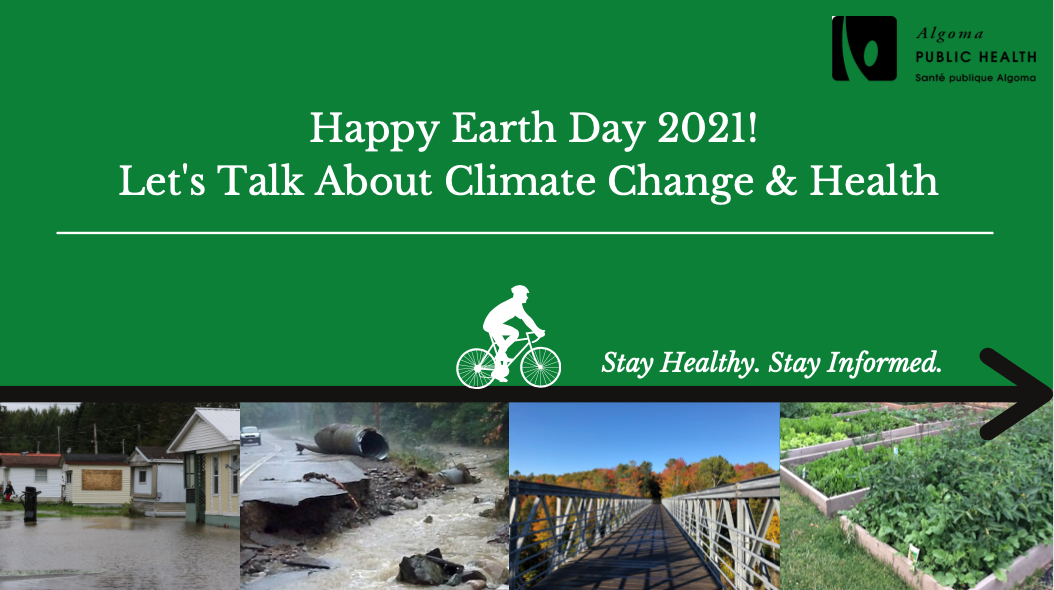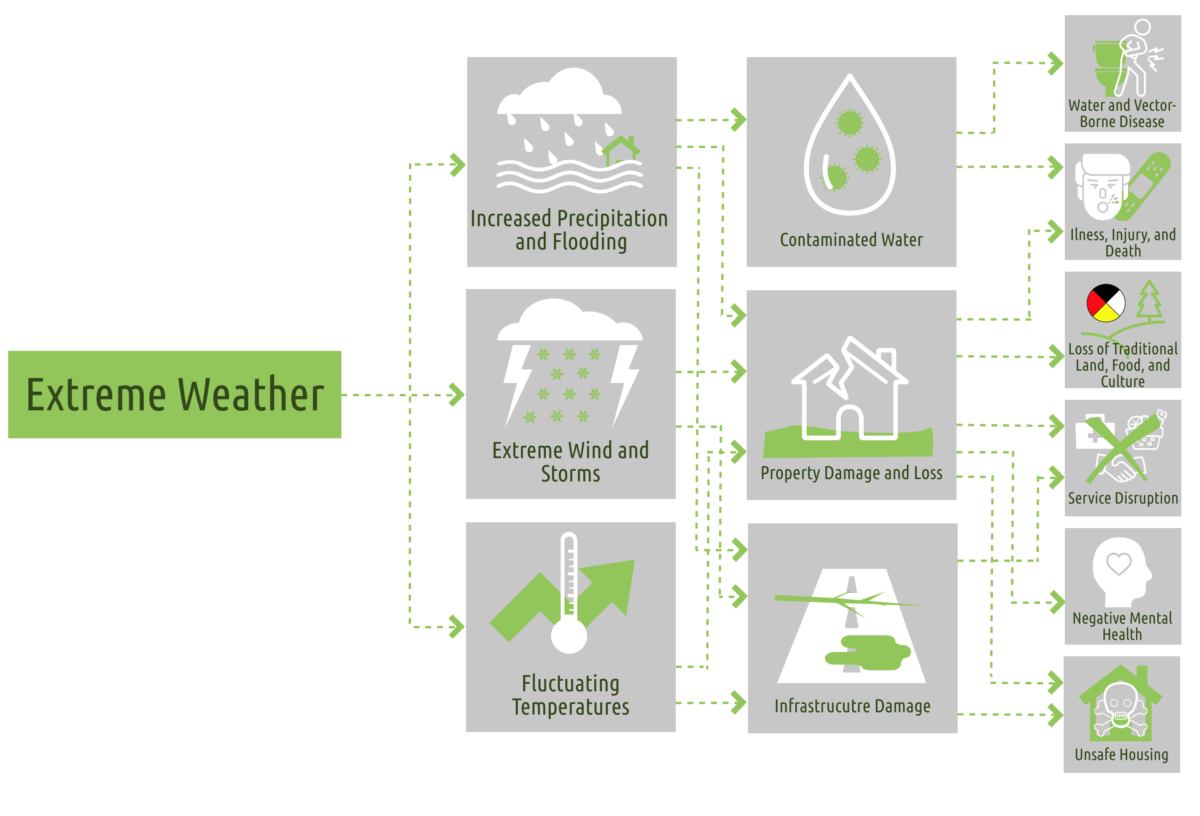
By guest writer Liliana Bressan, Public Health Specialist, Algoma Public Health
Happy Earth Day 2021! Earth Day is an annual event celebrated globally to support environmental protection, promote awareness of environmental issues, and protect our planet. It’s a fitting day to raise awareness of climate change impacts on public health.
“Does climate change affect our health? What role does Algoma Public Health (APH) play in addressing climate change?”
These are questions I often get in my role as an APH public health specialist. It’s fascinating. We as people are an extension of our environment, yet the intersection of public health and environmental health is not always clear. The links between climate change and health are also complex, which can make things a bit muddy to understand.
Climate change is not only a global crisis but also a public health emergency. It is considered “the greatest threat to global health in the 21st century.”1 Unfortunately, the health effects of a changing climate are already being felt today, and projections indicate a catastrophic risk to human health in the years to come.2 However, “tackling climate change could be the greatest global health opportunity of this century.”2
Climate change is projected to increase the likelihood and intensity of flooding, extreme heat, wildfires, and vector-borne disease, among other hazards. These will affect us all, reshaping the sustainability, health, and well-being of Algoma. As one example, increased precipitation and flooding can result in property loss or damages and contaminated water, which can affect health through water-borne disease, injury, service disruption, and impacts to traditional land and mental health.

Acting on climate change
In 2018, the Ontario Public Health Standards and Healthy Environments and Climate Change Guideline acknowledged the impacts of climate change on health, and mandated health units across Ontario to take evidence-informed action to understand and minimize the emerging health risks and impacts of climate change.
In response, APH, working with the six other northern Ontario health units, formed a network to develop a deeper, context-specific understanding of how a changing climate is and will continue to affect health in our district.
With funding support from Health Canada’s HealthADAPT program, APH is completing a climate change and health vulnerability and adaptation assessment to identify and prioritize:
- regional climate hazards
- populations who will be impacted first and worst
- actions to protect health
The main goal is to build and sustain APH’s capacity to protect health by identifying and adapting to the risks posed by climate change. Risks that those working on this project are examining include:
- extreme weather events
- extreme temperature
- food insecurity
- vector-borne disease
- mental health impacts
All of these have lasting impacts to human health and are projected to intensify with a changing climate.
Our climate change and health assessment incorporates:
- regional climate change projections
- adaptation capacity
- future health risks
- policy and program recommendations
Who’s involved?
To date, we have engaged with 26 partners across Algoma, including representatives from health and social services, environmental non-profit organizations, and district municipalities, as well as our First Nations and Metis partners, to understand the impacts of climate change in Algoma and strengthen relationships for effectively responding to climate change and health challenges.
We are proud to share that Clean North is an active partner in this project!
We understand that climate change is affecting the health and well-being of Algoma, and we are committed to taking action with our partners to inform and create healthy built and natural environments that protect health amid a changing climate.
This Earth Day 2021, we wanted to briefly share the link between climate change and public health, and to share a bit about the exciting work that has been happening to get us on track for climate action.
What can you do?
We all have a role to play in protecting our environment and health, by addressing climate change so join us this Earth Day by learning about climate change and getting outdoors:
- Click this link to learn more about climate change and health in Northern Ontario, thanks to the Northern Ontario Climate Change Collaborative.
- Go for a walk or cycle around your neighborhood to observe the natural and built environment that surrounds you and your home. The more aware we are of our environment, the more we will understand the changes happening around us. Be sure to dress for the weather!
- Connect virtually with a community elder or knowledge keeper to learn about the changes in our land, water, and air — both past and present — and how these changes are affecting traditional ways of living.
- Reduce your greenhouse gas emissions by choosing active transportation (walk, cycle) when you have to go out only for essential reasons.
- Start a new gardening project to grow fresh vegetables for you and your family. Supporting food security and sustainable food systems is an important piece of the climate puzzle.
- Reuse, reduce, and recycle. The less we use, the less we produce, and the less greenhouse gases and energy we use.
- Share a photo of your #EarthDayAlgoma activities online using this hashtag.
Stay safe!
Remember, gathering indoors with friends and relatives you do not live with is prohibited under the current province-wide shut down and stay at home order. Celebrate Earth Day safely and only with those in your household to protect against Covid-19. Avoid close contact with people you do not live with, stay home and isolate away from others if you have any symptoms, avoid non-essential travel, and wear a mask inside public spaces and when physical distancing cannot be maintained.
Thanks for reading our guest blog post this week. We look forward to sharing more resources from our Climate Project in the near future. Stay Healthy. Stay Informed.
Resources:
- World Health Organization. WHO calls for urgent action to protect health from climate change. 2015. Available from: https://www.who.int/globalchange/global-campaign/cop21/en/
- The Lancet. Health and climate change. 2015. Available from: https://www.thelancet.com/commissions/climate-and-health-2015




